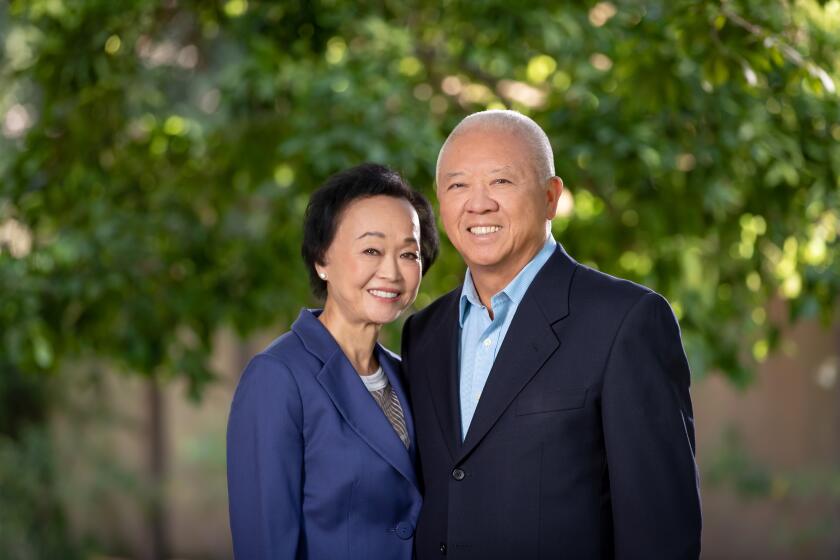‘Grief into action.’ Philanthropists give historic $150 million donation to City of Hope for pancreatic cancer research

- Share via
For entrepreneur and philanthropist Emmet Stephenson Jr., seeing his wife and friends die from pancreatic cancer served as a wake-up call.
His wife, Toni, a patient at Duarte, Calif.-based cancer center City of Hope, died at 74 after a four-month battle with pancreatic cancer.
Now Emmet and his daughter Tessa are donating a historic $150 million to the City of Hope to help advance research into finding a cure for what’s known as the “silent killer.”
“We decided we were going to turn our grief into action and we wanted as few people as possible to go through what we did,” said Tessa Stephenson Brand. “It was fast. It was painful.”
The donation is the largest single gift the City of Hope has ever received, surpassing the $100 million Panda Express founders Andrew and Peggy Cherng gave to the nonprofit last year.
World-renowned geneticist and diabetes expert Dr. Arthur Riggs also donated $100 million in 2021 to his longtime employer City of Hope before he passed away from a battle with a type of blood cancer known as lymphoma.
Panda Express owners Andrew and Peggy Cherng donated $100 million for Eastern and other alternative care at City of Hope. It’s the largest cancer care gift ever for the institution.
To help fuel the development of treatment and cures for pancreatic cancer, the Stephensons’ donation will help fund a $1 million prize that will be awarded annually (beginning in 2025) to a scientist or team that’s leading innovation in this field.
Pancreatic cancer research is underfunded and the City of Hope is trying to find new ways to cut down on bureaucracy so researchers and scientists can make progress at a faster rate, said Robert Stone, the chief executive of City of Hope. The gift equals nearly two-thirds of the total annual research budget for pancreatic cancer from the National Cancer Institute, City of Hope said in a news release about the donation.
“We’re trying to leapfrog and bring new ideas to challenge how research has been done traditionally,” Stone said.
Emmet Stephenson said the donation, which is expected to be spread out over 10 years, will also help fund grants, an annual symposium and a facility that collects tissues, blood and other materials needed for pancreatic cancer research.
“If we were to get lucky and find a cure for pancreatic cancer soon, then we’re happy to have the money go to the next most deadly disease in the cancer arena,” he said. Stephenson is the retired co-founder and chairman of tech company StarTek .
Pancreatic cancer is the third-leading cause of cancer death in the United States, according to the National Cancer Institute. In 2024, about 66,440 people nationwide will be diagnosed with pancreatic cancer and 51,750 people will die from this disease, according to estimates from The American Cancer Society.
Located behind the stomach, the pancreas is a large gland that helps people digest food and regulate blood sugar. Pancreatic cancer occurs when abnormal cells in the gland multiply, forming a tumor.
Dr. Daniel D. Von Hoff, a professor and cancer scientist at the Translational Genomics Research Institute in Phoenix, that is a part of the City of Hope, said pancreatic cancer is hard to detect early partly because the pancreas is tough to image and people often don’t show symptoms.
Some of the risk factors include smoking, obesity, alcohol and diabetes that can cause inflammation in the body. Pancreatic cancer is also on track to become the second-leading cause of cancer-related deaths before 2030 as the population ages. It’s most frequently diagnosed in people between the ages of 65 to 74, according to the National Cancer Institute.
Known as the “silent killer,” people often don’t show symptoms, which includes fatigue, belly pain and a loss appetite, before the cancer cells have multiplied.
“It’s like a toothache many people describe and so it’s kind of throbbing,” Von Hoff said. “By that time, it’s probably too late.”
Genetic testing, especially if you have a history of cancer in your family, could help detect a tumor early. Still, it’s possible to get pancreatic cancer at a young age.
Toni Bravo, a 21-year-old student who grew up in Tarzana, said she went to the emergency room last year because she was experiencing anxiety. After she got a CT scan, doctors in Indiana found a rare tumor on her pancreas. She became a patient at the City of Hope where she underwent surgery to remove the tumor from her pancreas.
The scariest part, she said, was she didn’t really have any symptoms or a history of pancreatic cancer.
As a pancreatic cancer survivor, Bravo isn’t letting the diagnosis define her life and urges people to listen to their bodies.
“The journey is hard,” she said. “Having the love of others makes it easier…and having that mental strength makes the journey possible.”
More to Read
Inside the business of entertainment
The Wide Shot brings you news, analysis and insights on everything from streaming wars to production — and what it all means for the future.
You may occasionally receive promotional content from the Los Angeles Times.












